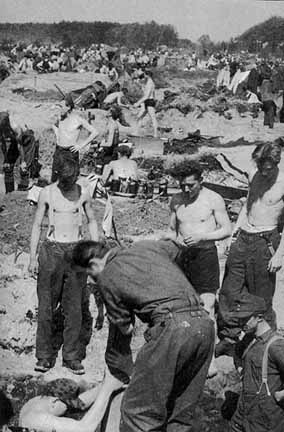Gotha, Germany - "Eisenhower's Death Camp"The city of Gotha is mostly known to Americans, if at all, as the first headquarters of the American Army in Germany, set up by General Dwight D. Eisenhower in April 1945, and as the site of one of the Prisoner of War camps where captured German soldiers were treated in a barbaric fashion with total disregard to the rules of civilized warfare, according to an American guard at the camp. General Eisenhower mentioned Gotha in his book "Crusade in Europe," as the nearest city to the "horror camp" at Ohrdruf-Nord, the first concentration camp to be discovered in Germany by American soldiers on April 4, 1945, but he failed to mention his own notorious POW camp located near Gotha. On March 10, 1945 as World War II was coming to an end, General Eisenhower signed an order creating the status of Disarmed Enemy Forces for the German Prisoners of War who would soon be surrendering to the Americans. This order was a violation of the Geneva Convention because it allowed Eisenhower to disregard the rules for the treatment of Prisoners of War. It allowed him to starve the German POWs, deny them the right to send and receive letters, and to receive Red Cross packages and packages from German civilians. All of these rights were enjoyed by the prisoners in the Nazi POW camps and even in the notorious concentration camps. Eisenhower signed this order before he had even seen the horrors of the concentration camps, which so affected him. In his book entitled "Other Losses," James Bacque wrote the following: There were no tents in the Gotha DEF camp, only the usual barbed wire fences round a field soon churned to mud. On the first day, they received a small ration of food, which was then cut in half. In order to get it, they were forced to run a gauntlet. Hunched over, they ran between lines of guards who hit them with sticks as they scurried towards their food. On April 27, they were transferred to the U.S. camp at Heidesheim further west where there was no food at all for days, then very little. On May 7, 1945, the German army surrendered to General Eisenhower, who refused to shake hands with the German General, as is customary. The neutral country of Switzerland was removed as the Protecting Power for German prisoners, which was another violation of the Geneva Convention. General George S. Patton quickly released the prisoners who had surrendered to his Third Army, but General Eisenhower held his POWs until the end of 1946, forcing them to live on starvation rations. Red Cross packages sent to the German POW camps were returned. The POW camps had no barracks or tents. The German prisoners were forced to dig holes in the ground for shelter, as the picture below shows. Even though the American army had plenty of tents, the prisoners lived for months in their holes. When it rained, the holes collapsed and the prisoners died.  After 1947, most of the records of the POW camps were destroyed by the U.S. government, according to James Bacque, the author of a book entitled "Other Losses." Bacque wrote that the Germans claimed that 1,700,000 soldiers, who were alive at the end of the war and had surrendered to the Allies, never returned home. All of the Allied countries denied responsibility, and the families were never told what had happened to their loved ones. The following quote by Lieutenant Ernest Fisher, of the 101st Airborne Division and former Senior Historian of the United States Army is from the book "Other Losses": Starting in April 1945, the United States Army and the French Army casually annihilated about one million men, most of them in American camps. Eisenhower's hatred, passed through the lens of a compliant military bureaucracy, produced the horror of death camps unequaled by anything in American military history... Stephen Ambrose, a noted World War II historian, disputes the claims made by James Bacque. His review of Bacque's book can be read at this web site: http://www.nizkor.org/hweb/people/b/bacque-james/ambrose-001.html For another opinion, go to this web site: http://www.rense.com/general46/germ.htm Ironically, Gotha also holds a place in history as the birthplace of the Socialist Worker's Party of Germany in 1875. The very house, called the Haus am Tivoli, where August Bebel and others got together to form this new leftist political party, is at the intersection of Cosmartstrasse, but it is closed to tourists. A plaque was placed outside the house by the Communist East German government, commemorating this as the place where a "glorious moment in the history of the German working class" took place. Karl Marx wrote a scathing paper called "Critique of the Gotha Programme" in which he criticized the new party as a sell-out of the proletariat and the Communist party, which he had popularized in 1848 with his "Communist Manifesto." In 1890, the name of the party was changed to the Social Democratic Party; it is still one of the largest political parties in Germany today. It was the Social Democrats who declared a Republic in Germany on November 9, 1918, forced the Kaiser to abdicate, and then signed the Armistice which ended World War I two days later. The Nazis referred to the Social Democrats as the "November Criminals" and called their actions "der Dolchstoss" (Stab in the Back). The claim that Germany had lost World War I on the battlefield was called "The Big Lie" by Hitler in his book, "Mein Kampf." The harsh Treaty of Versailles, signed by the Social Democrats in June 1919, insured that another war would soon follow. Gotha CastleHomeThis page was last updated on April 6, 2008 |